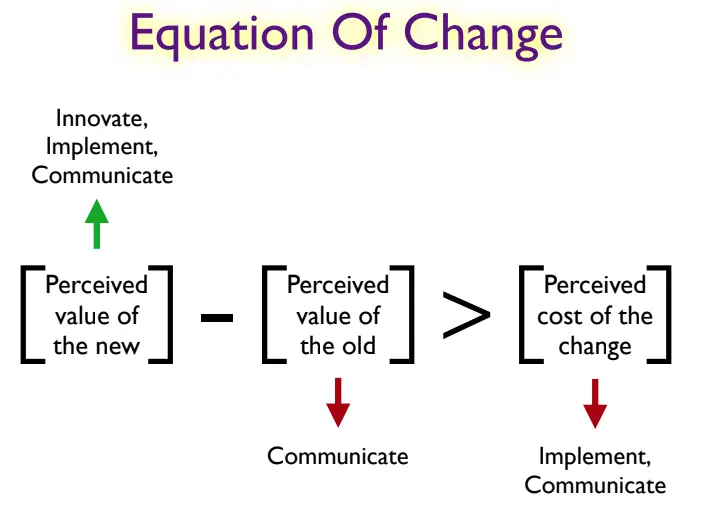- 2025-07-20
- From this great lecture “Cultural Co-Evolver: Frameworks, Skillsets, & Strategy for Embodied Action w/ Robert Gilman”
- The perceived value of the new needs to be high
- (This is what the green arrow signifies → you want to boost the perceived value of the new thing)
- The perceived value of the old needs to be trumped by the perceived value of the old
- (This this what the red arrow signifies → you want to lower the perceived value of the old thing, the status quo)
- The gained value needs to trump the cost of change
- The red arrow here → you can reduce the perceived cost via e.g. planning well, reducing friction
Rhymes with Luke Muehlhauser’s “procrastination equation”
- From his 2011 post “How to Beat Procrastination”
- From feeding his post into Gemini and asking for a breakdown of each component of the equation:
Expectancy
This refers to the perceived likelihood of success or receiving a reward for completing a task. If a person has a low expectation of succeeding, their motivation to perform the task will be low. Research from 39 studies has identified low expectancy as a significant cause of procrastination.
- Example: A salesperson named Eddie keeps putting off his sales calls because repeated rejections have demoralised him, and he now expects only failure.
Value
This component relates to how pleasant or rewarding a task is perceived to be. It includes both the enjoyment of the task itself and the value of what comes after its completion. Unsurprisingly, people tend to put off tasks they find unpleasant or dislike.
- Example: A student named Valerie finds her essay on municipal politics to be mind-numbingly dull. Because the task has low value for her, she puts it off to do other things, like texting friends.
Impulsiveness
Described as the strongest predictor of procrastination, impulsiveness is the tendency to be distracted by more immediate or interesting things. The more impulsive a person is, the more their motivation is negatively affected by delays in rewards. These individuals are less motivated by delayed rewards compared to immediate ones.
- Example: A man named Tom needed to book a hotel for his vacation but kept getting distracted by more urgent matters and forgot about it until the last minute, resulting in a poor selection of rooms.
Delay
This component concerns the time between performing a task and receiving its reward. The motivation to complete a task decreases as the time to its reward increases. This effect is magnified by a person’s level of impulsiveness.
- Example: A college student writing a term paper faces a long delay, as the paper is not due until the end of the semester. This large delay, combined with low value and expectancy, makes procrastination more likely. The availability of immediate pleasures on a college campus further amplifies the negative impact of the delay.
